الأسواق
عند تصميم تدخل إنساني وتحديد ما إذا كان سيتم استخدام المساعدات النقدية والقسائم، يجب أن يكون تحليل السوق جزءًا من تحليل الاستجابة الشامل. وثبت أن دعم الأسواق للعمل بشكل جيد يؤدي إلى تعافي أسرع وزيادة المرونة في المناطق المتضررة من الكوارث.
واستثمرت العديد من المنظمات في تطوير أدوات لدعم تحليل السوق وتفكر في البرمجة القائمة على السوق بشكل أكثر شمولية. يشمل ذلك التدخلات التي تستخدم السوق (مثل التحويلات النقدية إلى السكان المتضررين)، بالإضافة إلى التدخلات التي تدعم الأسواق بشكل مباشر (مثل المنح المشروطة للمتداولين لإعادة تشغيل أسواقهم).
Related initiatives
Featured content

Introduction to Market Analysis
دورة تدريبية
This 30 minute online course provides an introduction to the analysis of markets in emergency contexts, with input from some of the world’s leading thinkers on the topic.

A Practical Guide to Market Analysis in Humanitarian response
دورة تدريبية
A three to four hour online course designed to provide future humanitarian market assessment team members with a solid understanding of theory and steps of market assessments so that they can join assessment teams prepared with a basic understanding of what they will be doing and why.
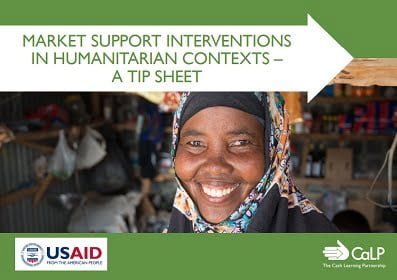
Market Support Interventions in Humanitarian Contexts – a Tip Sheet
Guidelines and Tools
This tip sheet defines what market support programming in humanitarian contexts is, and what it can look like in practice. It enables humanitarian practitioners to systematically consider market support interventions alongside other programme activities. The scope includes support interventions focusing on supply/availability and on demand/access. The tip sheet is based on secondary data...
Latest
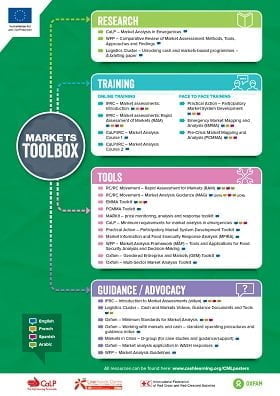
Markets Toolbox
Guidelines and Tools
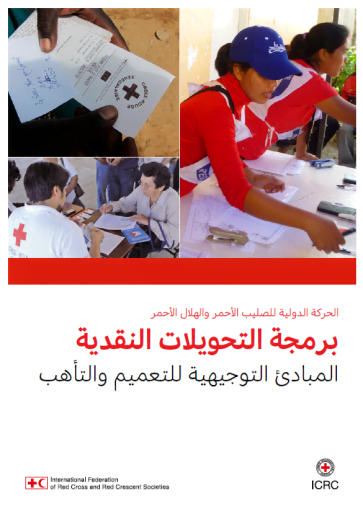
برمجة التحويلات النقدية: المبادئ التوجيهية للتعميم والتأهب
إرشادات وأدوات
مـن المعتـرف بـه علـى نطـاق واسـع أن برامـج التحويـلات النقديـة يمكـن أن تكـون فعاّلـة في دعـم السـكان المتضرريـن مـن الكـوارث أو النزاعـات المسـلحة بطريقة تحافـظ...
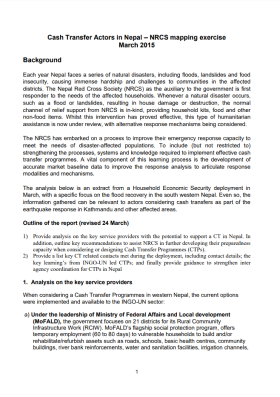
Cash Transfer Actors in Nepal – NRCS Mapping Exercise
Report
Each year Nepal faces a series of natural disasters, including floods, landslides and food insecurity, causing immense hardship and challenges to communities in the affected districts. The Nepal Red Cross Society (NRCS) as the auxiliary to the government is first responder to the needs of the affected...

Evaluation of the OneCard Pilot in Lebanon
Report
The OneCard pilot is part of the WFP-UNHCR Joint Plan of Action for Cash and Vouchers (2014), which aims to implement cash and vouchers using common e-delivery mechanisms. The objectives of the OneCard pilot were: To test the programmatic, technical, and financial efficiency and feasibility of the...
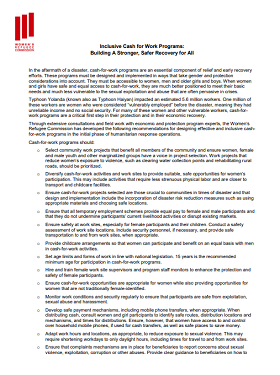
Inclusive Cash for Work Programs: Building A Stronger, Safer Recovery for All
Report
In the aftermath of a disaster, cash-for-work programs are an essential component of relief and early recovery efforts. These programs must be designed and implemented in ways that take gender and protection considerations into account. They must be accessible to women, men and older girls and boys. When...

Workshop Report – Cash Transfer Programming (CTP) in Northern Syria: Where are we now and where do we want to be?
Report
This report summarizes the outcomes of a one day workshop on Cash Transfer Programming (CTP) that was organized by the Cash-Based Responses Technical Working Group (CBR-TWG) for Northern Syria on April 28th 2015 in Gaziantep, Turkey. The workshop was attended by a wide group of stakeholders from the...
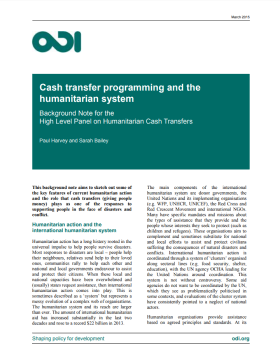
Cash Transfer Programming and the Humanitarian System
Policy paper
Cash transfer programming and the humanitarian system background note aims to sketch out some of the key features of current humanitarian action and the role that cash transfers play as one of the responses to supporting people in the face of disasters and conflict. Additionally, the publication...

Report from the Inaugural Markets and WaSH Learning Event
Report
This report summarizes the presentations and discussions that took place during a learning event on market-based programming targeting key humanitarian stakeholders in the WaSH sector. Held on October 13, 2015 at the IFRC office in Nairobi, the event was organized under the umbrella of the Markets in...
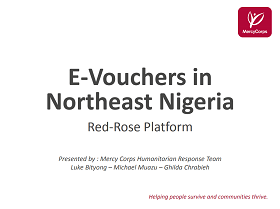
E-Vouchers in Northeast Nigeria
Report
OVERVIEW OF RED ROSE PLATFORM
DECISION TO USE IT. WHY?
The urgency of rapidly responding to the urgent food security needs of
vulnerable households in Northeast Nigeria displaced by conflict while
supporting the rapid recovery of small businesses in the food market
chain.
The importance of fostering...
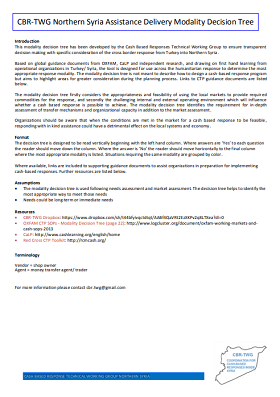
CBR-TWG Northern Syria Assistance Delivery Modality Decision Tree
Report
This modality decision tree has been developed by the Cash Based Responses Technical Working Group to ensure transparent decision making with specific consideration of the cross border response from Turkey into Northern Syria. Based on global guidance documents from OXFAM, the CALP Network and independent...
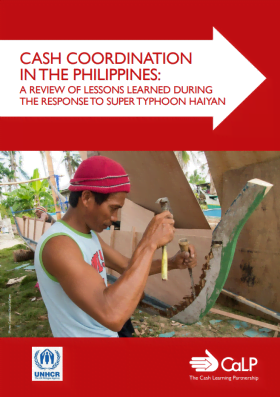
Cash Coordination in the Philippines: A review of lessons learned during the response to Super Typhoon Haiyan
Report
In the last five years there has been a growing trend towards the use of cash transfer programming (CTP) as a response modality in emergencies across the humanitarian sector. The fungibility of cash, when provided without restrictions, offers increased choice for affected populations to...

Electronic Cash Grants in Emergencies: Approaches and lessons learned
Report
Cash distributions in an emergency: A concept that seems so obvious today yet has only recently gained recognition within humanitarian response programming for its speed, efficiency and—above all—effectiveness.
This document provides a snapshot for humanitarian response peers on best practices,...

Remittances to Syria: What works, where and how
Report
This study sought to understand remittance flows into Syria, and established that various Informal Value Transfer Systems (IVTS) are used, to the exclusion of the formal banking sector. Registered and unregistered hawala, courier services and family connections are used. Remittances have played an...

Review of Targeting of Cash and Food Assistance for Syrian Refugees in Lebanon, Jordan and Egypt
Report
This report is an output of a consultancy to review the process of developing protocols for targeting cash and food assistance to Syrian refugees in Lebanon, Egypt and Jordan during 2014. Under the auspices of the High Level Meeting between WFP and UNHCR (May 2014) and the WFP and UNHCR Joint Action...
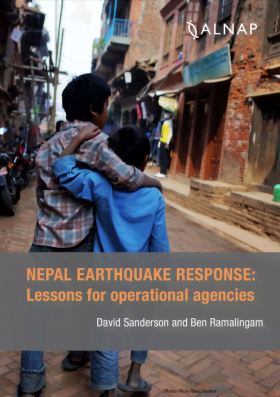
Nepal Earthquake Response: Lessons for operational agencies
Policy paper
In the aftermath of the April 2015 earthquake in Nepal, this paper looks at lessons drawn from previous comparable disasters and seeks to provide invaluable information and assistance to the operational agencies responding to the crisis. Seventeen Lessons give an overview of important learnings based on...

Documentation and Learning: Rapid emergency assistance to Typhoon Ruby (Hagupit) affected communities in the province of Samar, Philippines April 2015
Report
The documentation and learning study identifies good practices and lessons from the implementation of the Rapid Emergency Assistance to Typhoon Ruby (Hagupit) Affected Communities in the Province of Samar by Christian Aid (CA) and its local NGO partners – Coastal Core Incorporated (CCI), Center for...

Final Report for Assessment of the Impact of Cash For Work Beneficiaries training for Phases IIB and IV
Report
Phases IIB and IV of the Cash For Work (CFW) project were implemented by FAO Somalia over the period 2013-2015 and aimed at enhancing access to food by the food insecure households in the short-term, while supporting restoration of food production through the rehabilitation/construction of productive...

Capacity Building Theory Of Change
Guidelines and Tools
Capacity Building is a foundation of the CALP Network’s vision, focus and mandate, and our Capacity Building Strategy emanates from a Theory of Change that describes how the CALP Network’s inputs and activities result in short-term outcomes and can lead to long-term outcomes and ultimate impact. The...
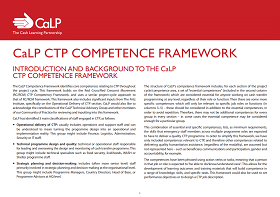
The CALP Network CTP Competence Framework
Guidelines and Tools
The CALP Network Competence Framework identifies core competences relating to CTP throughout the project cycle. This framework builds on the Red Cross/Red Crescent Movement (RC/RCM) CTP Competency Framework, and uses a similar project-cycle approach to that of RC/RCM framework. This framework also...
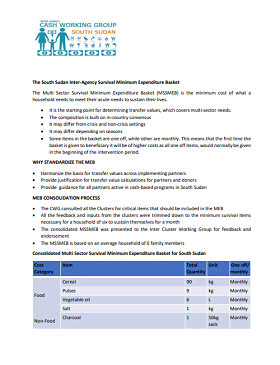
The South Sudan Inter-Agency Survival Minimum Expenditure Basket
Report
The Multi Sector Survival Minimum Expenditure Basket (MSSMEB) is the minimum cost of what a household needs to meet their acute needs to sustain their lives.
• It is the starting point for determining transfer values, which covers multi-sector needs.
• The composition is built on in-country consensus